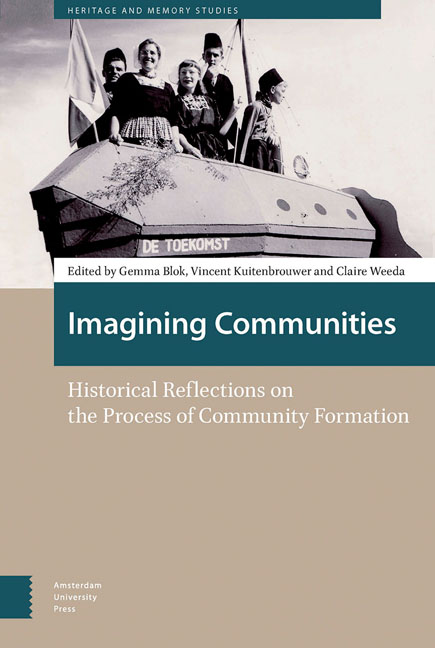Book contents
- Frontmatter
- Contents
- List of Figures
- Introduction
- 1 Meanwhile in Messianic Time: Imagining the Medieval Nation in Time and Space and English Drinking Rituals
- 2 Diverse Origins and Shared Circumstances: European Settler Identity Formation in the Seventeenth-Century Plantation Colony of Suriname
- 3 Imagining Europe: The Peace of Ryswick (1697) and the Rise of European Consciousness
- 4 Gypsy Music and the Fashioning of the National Community
- 5 ‘Tired, Worried and Overworked’: An International Imagined Community of Nervous Sufferers in Medical Advertisements, 1900-1920
- 6 ‘From Heart to Heart’: Colonial Radio and the Dutch Imagined Community in the 1920s
- 7 Indonesian Nationalism in the Netherlands, 1920s-1930s: Long-Distance Internationalism of Elite Pilgrims in Homogeneous, Empty Time
- 8 Time, Rhythm and Ritual: Imagined Communities in L’espoir (1937) and Les sept couleurs (1939)
- 9 Stamverwantschap and the Imagination of a White, Transnational Community: The 1952 Celebrations of the Jan van Riebeeck Tercentenary in the Netherlands and South Africa
- 10 ‘L’Oranie Cycliste, une grande famille’: Recycling Identities and the Pieds-Noirs Communitas, 1976-2016
- 11 Remembering and Imagining the National Past: Public Service Television Drama and the Construction of a Flemish Nation, 1953-1989
- Index
Introduction
Published online by Cambridge University Press: 11 December 2020
- Frontmatter
- Contents
- List of Figures
- Introduction
- 1 Meanwhile in Messianic Time: Imagining the Medieval Nation in Time and Space and English Drinking Rituals
- 2 Diverse Origins and Shared Circumstances: European Settler Identity Formation in the Seventeenth-Century Plantation Colony of Suriname
- 3 Imagining Europe: The Peace of Ryswick (1697) and the Rise of European Consciousness
- 4 Gypsy Music and the Fashioning of the National Community
- 5 ‘Tired, Worried and Overworked’: An International Imagined Community of Nervous Sufferers in Medical Advertisements, 1900-1920
- 6 ‘From Heart to Heart’: Colonial Radio and the Dutch Imagined Community in the 1920s
- 7 Indonesian Nationalism in the Netherlands, 1920s-1930s: Long-Distance Internationalism of Elite Pilgrims in Homogeneous, Empty Time
- 8 Time, Rhythm and Ritual: Imagined Communities in L’espoir (1937) and Les sept couleurs (1939)
- 9 Stamverwantschap and the Imagination of a White, Transnational Community: The 1952 Celebrations of the Jan van Riebeeck Tercentenary in the Netherlands and South Africa
- 10 ‘L’Oranie Cycliste, une grande famille’: Recycling Identities and the Pieds-Noirs Communitas, 1976-2016
- 11 Remembering and Imagining the National Past: Public Service Television Drama and the Construction of a Flemish Nation, 1953-1989
- Index
Summary
‘IC is not my book anymore.’With these words, taken from the epilogue of the 2006 revised edition of Imagined Communities, Benedict Anderson closed his keynote lecture delivered at the symposium celebrating his book’s 30th anniversary, at the University of Amsterdam on 12 September 2013. We, the organizers of that symposium and the editors of this volume, took Anderson's words as a cue to explore his conceptual framework for identity formation in the context of the historical academic discipline.
Over the decades Imagined Communities has been a source of inspiration for scholars across the globe. Indeed, the ideas presented in Anderson’s book have been applied to a bewildering variety of communities: in past, present and future, and on a local, national and transnational level. On the one hand, this scholarship is an impressive testimony to the intellectual vitality of the conceptual framework of imagined communities. On the other, however, it might somewhat obfuscate the concept's analytical power. The book's cogency is further complicated by the fact that both regimes and insurgents have used the conceptual framework underlying the imagined community to mobilize support for their political goals.
Anderson himself was keenly aware of this problem, as is illustrated by a joke he shared with us in our email correspondence about feeling part of a global community of Benedicti: ‘Idly I checked out the tenure of the Papal Benedicts, quite amusing: Benedict I – 4 years; Ben II – l year; Ben III, less than one year; Ben IV – 3 years; Ben V – l year; Ben VI – l year; Ben VII – 9 years; Ben VIII – less than one year; Ben IX – 13 years; Ben X – l year; Ben XI – 2 years; Ben XII – 8 years; Ben XIII – 10 years (antipope?); Ben XIII True Pope – 6 years; Ben XIV – 18 years; Ben XV – 8 years, and Ben XVI – 8 years. 95 years in all, average tenure 6 years poor wretches. Ciao, Ben.’
Debating Imagined Communities
In his memoir A Life Beyond Boundaries (which appeared posthumously in 2016), Anderson reflected on the vicissitudes of Imagined Communities within the wider academic debate, including both its conception and dissemination.
- Type
- Chapter
- Information
- Imagining CommunitiesHistorical Reflections on the Process of Community Formation, pp. 7 - 20Publisher: Amsterdam University PressPrint publication year: 2018
- 1
- Cited by



